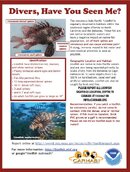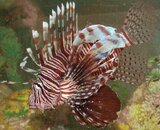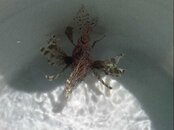Here is some information about Lionfish and the recent Aruba story from September 14, 2009.
Please report all sightings!
Thank you and safe diving,
Bryan
Lionfish Information
28 July, 2009
A heads up and special request to Curacao divers from Dr. Mark Vermeij, Science Director at Curacao's Carmabi Foundation (CARMABI | Caribbean Research & Management of Biodiversity in Curacao) :
Now that the invasive lionfish has been observed North and South of Curacao, it will just be a matter of time before this fish will show up on Curacao. Attached you'll find a flyer <scroll down to see the flyer> that you might find useful to alert your divers to the lionfish and help collect observations in case this thing passes our doorstep. For further information:
http://www.caribbeanfmc.com/LIONFISH/lionfish.htm
Lionfish Invasion: Super Predator Threatens Caribbean Coral Reefs
NOAA National Ocean Service Education: Lionfish Discovery Story
Best regards
Mark
September 14, 2009
Today a Lionfish sighting was reported from Aruba on the coral-list by Monique Grol, a marine biologist of the University of Nijmegen who has worked on Aruba. On further inquiry she provided the following details:
The Lionfish was reported to Monique by an experienced dive master - whom she knows and feels is reliable - of dive shop Unique Watersports.
He saw it at Harbour reef, Aruba, at a depth of 15 m (45 ft), close to the bottom underneath a block of coral. According to the dive master it was a large adult, about the size of an adult scorpionfish (i.e.
probably about 30 cm). There is no photo available, hopefully someone there can go back and verify the sighting with a photograph. I will keep you all updated if I hear more.
Best,
Paul
--
Paul C. Hoetjes
Senior Policy Advisor
Department of Environment & Nature (MINA) Ministry of Public Health & Social Development (VSO) Schouwburgweg 26 (APNA building) Curaçao Netherlands Antilles
Please report all sightings!
Thank you and safe diving,
Bryan
Lionfish Information
28 July, 2009
A heads up and special request to Curacao divers from Dr. Mark Vermeij, Science Director at Curacao's Carmabi Foundation (CARMABI | Caribbean Research & Management of Biodiversity in Curacao) :
Now that the invasive lionfish has been observed North and South of Curacao, it will just be a matter of time before this fish will show up on Curacao. Attached you'll find a flyer <scroll down to see the flyer> that you might find useful to alert your divers to the lionfish and help collect observations in case this thing passes our doorstep. For further information:
http://www.caribbeanfmc.com/LIONFISH/lionfish.htm
Lionfish Invasion: Super Predator Threatens Caribbean Coral Reefs
NOAA National Ocean Service Education: Lionfish Discovery Story
Best regards
Mark
September 14, 2009
Today a Lionfish sighting was reported from Aruba on the coral-list by Monique Grol, a marine biologist of the University of Nijmegen who has worked on Aruba. On further inquiry she provided the following details:
The Lionfish was reported to Monique by an experienced dive master - whom she knows and feels is reliable - of dive shop Unique Watersports.
He saw it at Harbour reef, Aruba, at a depth of 15 m (45 ft), close to the bottom underneath a block of coral. According to the dive master it was a large adult, about the size of an adult scorpionfish (i.e.
probably about 30 cm). There is no photo available, hopefully someone there can go back and verify the sighting with a photograph. I will keep you all updated if I hear more.
Best,
Paul
--
Paul C. Hoetjes
Senior Policy Advisor
Department of Environment & Nature (MINA) Ministry of Public Health & Social Development (VSO) Schouwburgweg 26 (APNA building) Curaçao Netherlands Antilles







